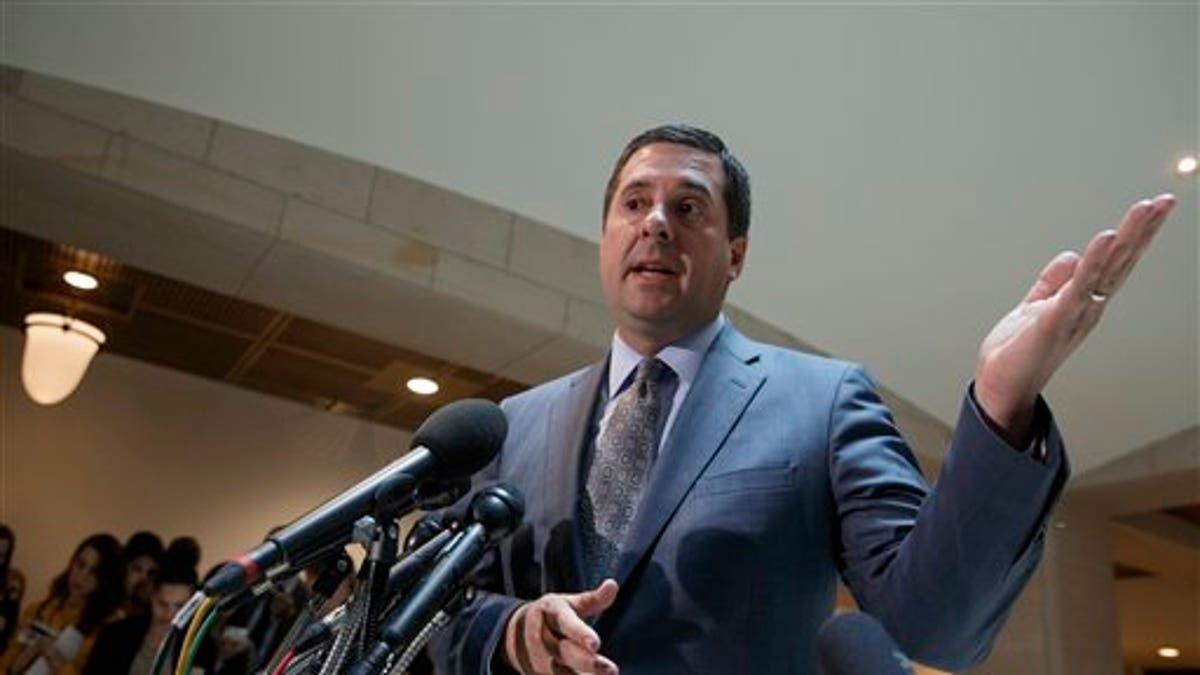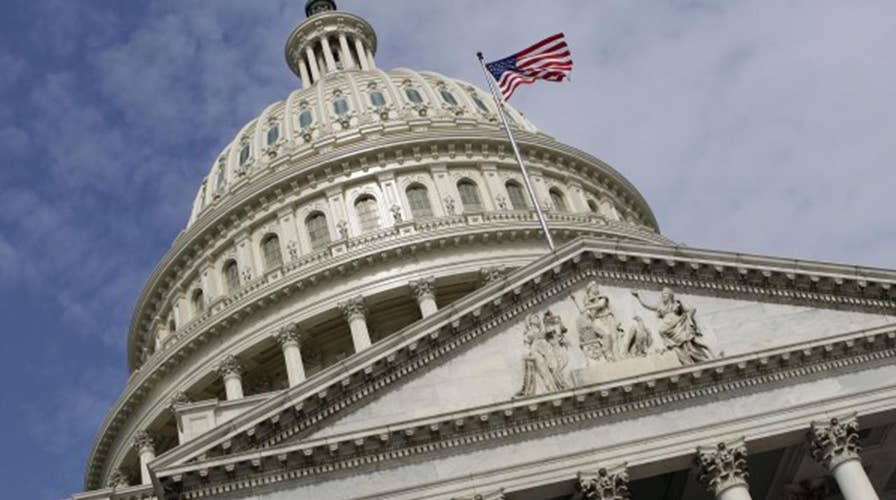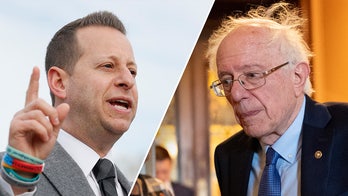Republicans launch new probes into Obama-era controversies
Rep. Jim Jordan talks efforts to dig deeper into the FBI's handling of the Clinton email case and the Uranium One deal.
House Republicans on Tuesday launched new probes into several Obama-era controversies, covering both the Justice Department’s 2016 handling of the Clinton email case and the administration’s 2010 approval for the sale of a mining company that gave the Russians partial control over American uranium reserves.
House Intelligence Committee Chairman Devin Nunes, R-Calif., announced his committee and the House Oversight Committee will investigate the so-called Uranium One deal.
“We’re not going to jump to any conclusions, but we’re going to try and get the facts,” Nunes said.
Separately, the House oversight and judiciary committees announced a joint investigation into the Justice Department and FBI’s handling of the Clinton email probe.
"Decisions made by the Department of Justice in 2016 have led to a host of outstanding questions that must be answered,” House Judiciary Committee Chairman Bob Goodlatte, R-Va., and House Oversight Committee Chairman Trey Gowdy, R-S.C., said in a statement.
TABLES TURNED AS DEMS FACE RUSSIA CONTROVERSIES?
Both controversies have returned to the headlines in recent weeks. The uranium deal, which was covered extensively in 2015, concerns the 2010 approval of the sale of Canadian mining company Uranium One to Russia’s Rosatom nuclear company. The U.S. was involved because the sale gave the Russians control of part of the uranium supply in the U.S.
The Hill reported, however, that the FBI had evidence as early as 2009 that Russian operatives used bribes, kickbacks and other dirty tactics to expand Moscow’s atomic energy footprint in the U.S., related to a subsidiary of the same Russia firm. Republican lawmakers on Capitol Hill quickly started asking questions about how the deal was approved the following year by an inter-agency committee.
Nunes said Tuesday the main question for Hill investigators will be whether there was an FBI probe at the time and “if so, why was Congress not informed of this matter.”
“It’s important that we find out why that deal went through,” Rep. Peter King, R-N.Y., said.

Rep. Devin Nunes, R-Calif., has announced a new congressional probe of the 2010 Uranium One deal. (AP)
Rep. Ron DeSantis, R-Fla., threatened to use subpoena power to get access to a former FBI informant in the case who apparently has not yet been released from a nondisclosure agreement.
U.S. government officials tell Fox News that senior Justice Department officials are in deliberations over providing the FBI informant to Congress. The officials met Tuesday to work on the parameters under which the informant would be allowed to testify.
While scrutinizing the 2010 approval, Republican lawmakers have also revived questions that first surfaced in 2015 about payments to both Bill Clinton and the Clinton Foundation from “interested parties.”
Addressing the matter Monday on C-SPAN, Hillary Clinton said “it’s the same baloney they’ve been peddling for years, and there’s been no credible evidence by anyone. In fact, it’s been debunked repeatedly and will continue to be debunked.”
The 2016 Democratic presidential nominee said these issues are just part of the “distraction and diversion” from the investigation into Russian meddling and possible coordination with Trump associates in last year’s election.
“The closer the investigation about real Russian ties between Trump associates and real Russians … the more they want to just throw mud on the wall,” Clinton said.
As for the separate probe of the handling of the Clinton email case, Goodlatte and Gowdy said the investigation would cover:
- The FBI’s decision to publicly announce the Clinton email investigation but not announce the probe of Trump campaign associates
- The decision to notify Congress that the bureau was revisiting the email probe in the fall of 2016
- The decision to “appropriate full decision making in respect to charging or not charging Secretary Clinton to the FBI rather than the DOJ”
- The FBI’s “timeline in respect to charging decisions”
Goodlatte and Gowdy said: "The Committees will review these decisions and others to better understand the reasoning behind how certain conclusions were drawn.”
The circumstances surrounding former FBI Director James Comey’s public decision not to pursue charges against Clinton have come under renewed scrutiny in recent months, following allegations that Comey drafted an “exoneration statement” for Clinton months before she and other key witnesses were interviewed.
The FBI last week released emails appearing to prove that Comey began drafting a memo regarding his July 2016 statement as early as May. The contents of the emails were largely unclear as nearly all of it was redacted. The now-public records show the email titled “Midyear Exam --- UNCLASSIFIED” was sent by Comey on May 2, 2016, to Deputy Director Andrew McCabe, general counsel James Baker and chief of staff and senior counselor James Rybicki.
On May 16, a response email from Rybicki, said, “Please send me any comments on this statement so we may roll into a master doc for discussion with the Director at a future date. Thanks, Jim.”
The existence of the documents was first brought to light by Sen. Chuck Grassley, R-Iowa, chairman of the Senate Judiciary Committee, and Sen. Lindsey Graham, R-S.C., also a member of the committee, after they reviewed transcripts of interviews with top Comey aides who alluded to the email’s existence.
The issue has raised questions about Comey’s past explanations for his decision to go public in the case.
In a June hearing before the Senate Intelligence Committee, Comey was asked whether his decision to announce the results of the investigation was influenced by then-Attorney General Loretta Lynch’s infamous meeting days earlier on an Arizona tarmac with former President Bill Clinton.
“Yes, in an ultimately conclusive way, that was the thing that capped it for me – that I had to do something separately to protect the credibility of the investigation,” Comey said.
At a House Judiciary Committee hearing in September 2016, Comey also testified that he made the decision not to recommend criminal charges “after” the FBI interviewed Clinton.
The potential conflicts revived interests among Clinton’s critics in revisiting aspects of the case. Last month, Republicans on the House Judiciary Committee formally renewed their call for a second special counsel to probe 2016 controversies involving Hillary Clinton and the Obama administration.
Congressional Democrats on Tuesday responded to the new probes by accusing Republicans of trying to distract from their “lack … of oversight” regarding the Russia threat.
“This new investigation is a massive diversion to distract from the lack of Republican oversight of the Trump Administration and the national security threat that Russia poses,” Reps. Elijah Cummings, D-Md., and John Conyers Jr., D-Mich., the top Democrats on the oversight and judiciary committees, respectively, said in a statement. “The Russian government continues to represent a clear and present threat to the United States and our democratic system, and we are the targets of near-constant cyberattacks by foreign adversaries. Yet House Republicans have taken no concrete steps to secure our next election. Apparently, House Republicans are more concerned about Jim Comey than Vladimir Putin.”
For its part, the Justice Department released a statement vowing to “fully cooperate with this important Congressional investigation.”
Fox News’ Judson Berger, Chad Pergram, Catherine Herridge and Jake Gibson contributed to this report.





